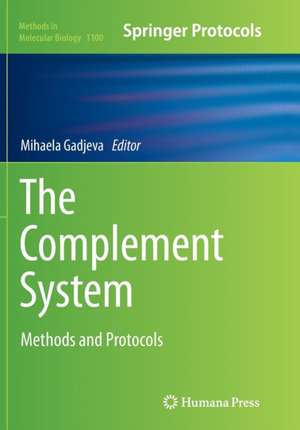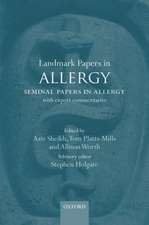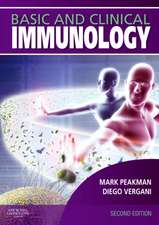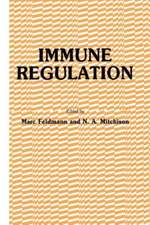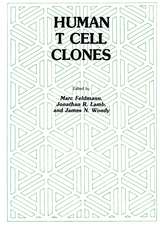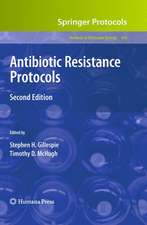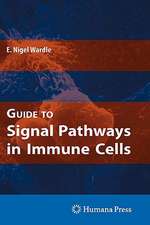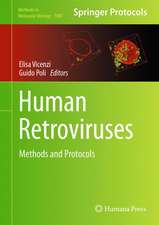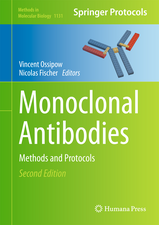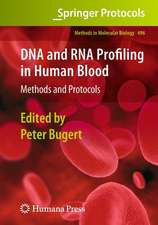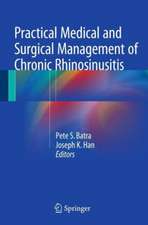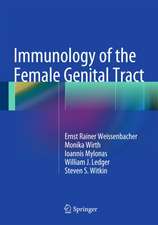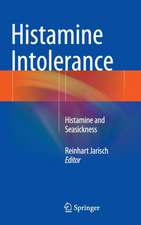The Complement System: Methods and Protocols: Methods in Molecular Biology, cartea 1100
Editat de Mihaela Gadjevaen Limba Engleză Paperback – 23 aug 2016
Authoritative and practical, Complement Systems: Methods and Protocols provides a collection of well-established “classical” assays and recently developed “new” assays to analyze the complement system activation will be useful to a wide audience of scientists.
| Toate formatele și edițiile | Preț | Express |
|---|---|---|
| Paperback (1) | 789.76 lei 6-8 săpt. | |
| Humana Press Inc. – 23 aug 2016 | 789.76 lei 6-8 săpt. | |
| Hardback (1) | 1113.99 lei 6-8 săpt. | |
| Humana Press Inc. – 12 noi 2013 | 1113.99 lei 6-8 săpt. |
Din seria Methods in Molecular Biology
- 9%
 Preț: 791.63 lei
Preț: 791.63 lei - 23%
 Preț: 598.58 lei
Preț: 598.58 lei - 20%
 Preț: 882.98 lei
Preț: 882.98 lei -
 Preț: 252.05 lei
Preț: 252.05 lei - 5%
 Preț: 802.70 lei
Preț: 802.70 lei - 5%
 Preț: 729.61 lei
Preț: 729.61 lei - 5%
 Preț: 731.43 lei
Preț: 731.43 lei - 5%
 Preț: 741.30 lei
Preț: 741.30 lei - 5%
 Preț: 747.16 lei
Preț: 747.16 lei - 15%
 Preț: 663.45 lei
Preț: 663.45 lei - 18%
 Preț: 1025.34 lei
Preț: 1025.34 lei - 5%
 Preț: 734.57 lei
Preț: 734.57 lei - 18%
 Preț: 914.20 lei
Preț: 914.20 lei - 15%
 Preț: 664.61 lei
Preț: 664.61 lei - 15%
 Preț: 654.12 lei
Preț: 654.12 lei - 18%
 Preț: 1414.74 lei
Preț: 1414.74 lei - 5%
 Preț: 742.60 lei
Preț: 742.60 lei - 20%
 Preț: 821.65 lei
Preț: 821.65 lei - 18%
 Preț: 972.30 lei
Preț: 972.30 lei - 15%
 Preț: 660.49 lei
Preț: 660.49 lei - 5%
 Preț: 738.41 lei
Preț: 738.41 lei - 18%
 Preț: 984.92 lei
Preț: 984.92 lei - 5%
 Preț: 733.29 lei
Preț: 733.29 lei -
 Preț: 392.60 lei
Preț: 392.60 lei - 5%
 Preț: 746.26 lei
Preț: 746.26 lei - 18%
 Preț: 962.66 lei
Preț: 962.66 lei - 23%
 Preț: 860.22 lei
Preț: 860.22 lei - 15%
 Preț: 652.64 lei
Preț: 652.64 lei - 5%
 Preț: 1055.50 lei
Preț: 1055.50 lei - 23%
 Preț: 883.87 lei
Preț: 883.87 lei - 19%
 Preț: 491.89 lei
Preț: 491.89 lei - 5%
 Preț: 1038.86 lei
Preț: 1038.86 lei - 5%
 Preț: 524.16 lei
Preț: 524.16 lei - 18%
 Preț: 2122.34 lei
Preț: 2122.34 lei - 5%
 Preț: 1299.23 lei
Preț: 1299.23 lei - 5%
 Preț: 1339.12 lei
Preț: 1339.12 lei - 18%
 Preț: 1390.26 lei
Preț: 1390.26 lei - 18%
 Preț: 1395.63 lei
Preț: 1395.63 lei - 18%
 Preț: 1129.65 lei
Preț: 1129.65 lei - 18%
 Preț: 1408.26 lei
Preț: 1408.26 lei - 18%
 Preț: 1124.92 lei
Preț: 1124.92 lei - 18%
 Preț: 966.27 lei
Preț: 966.27 lei - 5%
 Preț: 1299.99 lei
Preț: 1299.99 lei - 5%
 Preț: 1108.51 lei
Preț: 1108.51 lei - 5%
 Preț: 983.76 lei
Preț: 983.76 lei - 5%
 Preț: 728.16 lei
Preț: 728.16 lei - 18%
 Preț: 1118.62 lei
Preț: 1118.62 lei - 18%
 Preț: 955.25 lei
Preț: 955.25 lei - 5%
 Preț: 1035.62 lei
Preț: 1035.62 lei - 18%
 Preț: 1400.35 lei
Preț: 1400.35 lei
Preț: 789.76 lei
Preț vechi: 831.33 lei
-5% Nou
Puncte Express: 1185
Preț estimativ în valută:
151.17€ • 164.26$ • 127.06£
151.17€ • 164.26$ • 127.06£
Carte tipărită la comandă
Livrare economică 22 aprilie-06 mai
Preluare comenzi: 021 569.72.76
Specificații
ISBN-13: 9781493963065
ISBN-10: 1493963066
Pagini: 399
Ilustrații: XVI, 383 p. 81 illus., 27 illus. in color.
Dimensiuni: 178 x 254 x 21 mm
Greutate: 0.69 kg
Ediția:Softcover reprint of the original 1st ed. 2014
Editura: Humana Press Inc.
Colecția Humana
Seria Methods in Molecular Biology
Locul publicării:Totowa, NJ, United States
ISBN-10: 1493963066
Pagini: 399
Ilustrații: XVI, 383 p. 81 illus., 27 illus. in color.
Dimensiuni: 178 x 254 x 21 mm
Greutate: 0.69 kg
Ediția:Softcover reprint of the original 1st ed. 2014
Editura: Humana Press Inc.
Colecția Humana
Seria Methods in Molecular Biology
Locul publicării:Totowa, NJ, United States
Cuprins
Overview.- Evaluation of Complement Function by ELISA.- Classical Complement Pathway Component C1q – Purification of Human C1q, Isolation of C1q Collagen-like and Globular Head Fragments and Production of Recombinant C1q – Derivatives. Functional Characterization.- Classical Complement Pathway Components C1r and C1s – Purification from Human Serum and in Recombinant Form and Functional Characterization.- Expression and Purification Methods for the Production of Recombinant Human Complement Component C2.- Purification and Characterisation of human and Mouse Complement C3.- Purification of Human Complement Protein C5.- Quantification of Complement C5b-9 Binding to Cells by Flow Cytometry.- Challenges and Opportunities in Fractionation of Recombinant Human Mannan-binding Lectin.- Genotyping of FCN and MBL2 Polymorphisms using Pyrosequencing.- Assay for Estimation of the Functional Activity of the Mannan Binding Lectin Pathway of the Complement System.- Purification, Measurement of Concentration, and Functional Complement Assay of Human Ficolins.- Purification and Functional Analysis of Human Properdin.- Purification and Functional Characterization of C4b-binding Protein (C4BP).- Purification and Functional Characterization of Factor I.- C1 inhibitor – Quantification and Purification.- Purification, Quantification and Functional Analysis of Complement Factor H.- Factor H-related Proteins.- Functional Evaluation of Factor H genetic and Acquired Abnormalities; Application for Atypical Hemolytic Uremic Syndrome (aHUS).- Anti-Factor H Auto Antibodies Assay.- Purification of Native Surfactant Protein SP-A from Pooled Amniotic Fluid and Bronchoalveolar Lavage.- Purification of Surfactant Protein D (SP- D) from Pooled Amniotic Fluid and Bronchoalveolar Lavage.- Functional Analysis of C5a Effector Responses In Vitro and In Vivo.- Detection of Complement Receptors 1 and 2 on Mouse Splenic B Cells using Flow Cytometry.- Quantificationof Complement Receptor 2 Calcium Signaling Enhancement Using Flow Cytometry.- Purification of C1q Receptors and Functional Analysis.- Detection of Cell Membrane-bound CD46 using Flow Cytometry.- Detection of CD59 using Flow Cytometry.- Functional Analysis of CD59 using Complement Dependent Cytotoxicity Assay.- Detection of Soluble CR3 (CD11b/CD18) by Time-resolved Immunofluorometry.- Analysis of the Complement Activation in Mice.- Opsonophagocytic Assay.
Textul de pe ultima copertă
Complement Systems: Methods and Protocols is composed of 32 individual chapters that describe a variety of protocols to purify and analyze the activity of the individual complement components or pathways. It includes assays that describe detection of complement SNPs, clinical methods to evaluate complement system activation and data interpretation. Written in the highly successful Methods in Molecular Biologyseries format, chapters include introductions to their respective topics, lists of the necessary materials and reagents, step-by-step, readily reproducible laboratory protocols, and tips on troubleshooting and avoiding known pitfalls.
Authoritative and practical, Complement Systems: Methods and Protocols provides a collection of well-established “classical” assays and recently developed “new” assays to analyze the complement system activation will be useful to a wide audience of scientists.
Authoritative and practical, Complement Systems: Methods and Protocols provides a collection of well-established “classical” assays and recently developed “new” assays to analyze the complement system activation will be useful to a wide audience of scientists.
Caracteristici
Presents current up-to-date methodologies Features tips on trouble shooting and avoiding known pitfalls Contains key notes and implementation advice from the experts
